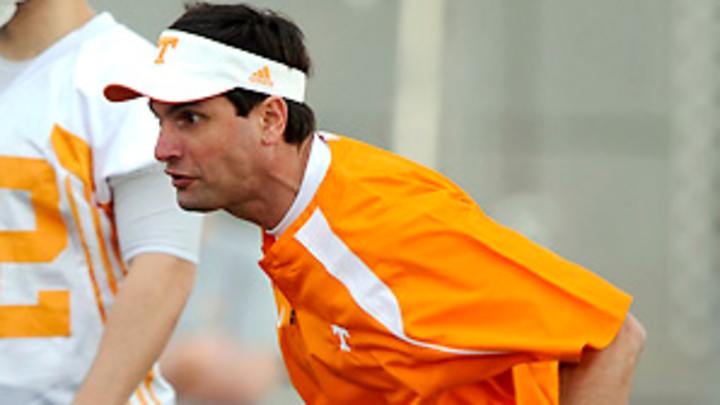Tennessee's Dooley latest to forget he's a football coach, not God


Personally speaking, my favorite part is the missed irony.
That's what I love about the majority of America's big-time Division I college football coaches. Their existences are lathered in ironic inanity. I mean, they bathe in the stuff, then shampoo thoroughly without rinsing. Yet come day's end, they don't see it. They never, ever see it.
College football coaches talk to their players about loyalty and family, then do the ol' Snagglepuss (Exit -- stage left!) as soon as a better offer comes along. College football coaches talk about pride and "being a man," yet grovel at the toes of every 17-year-old child with a golden arm or 4.3 speed. College football coaches talk about "looking around this room and knowing it's not about the uniform, but what's inside," then accept $2 million annually from adidas to promote what's on the outside. They are, to be blunt, a pathetic lot, and I'd just as soon have my son stay home, obsess over the Atari 2600 and smoke 10 packs of Marlboros a day than play for the used car salesmen at schools like Alabama or Arkansas or USC.
But, alas, perhaps they can't be helped. Perhaps Doltcoachitis isn't so much a pre-diagnosed condition as it is a contagious disease. Take, for example, the case of Derek Dooley, new head football coach at the University of Tennessee and a man with, well, not all that much to strut about.
Before arriving in Knoxville earlier this year, Dooley had only been a collegiate head coach once before -- at Louisiana Tech, where in three seasons he compiled a 17-20 record. Because he was Tennessee's 134th choice to replace the departed (and detested) Lane Kiffin (If you're wondering, No. 133 was David Steele, former bass player for the Fine Young Cannibals, No. 132 was Emmanuel Lewis andNo. 131 was me), most assumed Dooley would arrive with great humility and appreciation. Which he did.
For a spell.
Because he is a head coach of a Division I college football team, and because head coaches of Division I college football teams often confuse themselves with God, Dooley spent the preseason banning the media from practices and scrimmages. Which is, to be fair, his right -- though without good reason. When the Vols recently held a mock game, reporters asked if they'd finally be permitted to watch Tennessee play. According to knoxnews.com, Dooley told the press that he would only allow access to those members of the press he deemed worthy.
Here is what he said: "Show up, which is No. 1. Give effort, and be respectful. That's kind of a Rule of Three in our program. Show up, meaning be where you're supposed to be -- it doesn't matter what it is. Give effort, which means give your best -- just try. And be respectful when you encounter other people.
"Now, you guys, there are a few of you guys who have gone above and beyond during training camp, just like some of the players, came for the majority of the front-end and back-end (of practice), you gave effort, worked and asked some tough questions. You were always respectful -- which I appreciate -- and so, John Painter (associate director of media relations for UT football) has issued the first-annual Iron Vol of the Media. We've got a few people we wanted to recognize who will be attending our Wednesday night mock game for the entire session with the understanding that abuse brings control.
"So it's not a punishment, because I already hear (it). It's not a punishment to those that didn't come, it's just like the players. It's a simple reward for exemplary performance, and I hope we'll get something out of it."
Translation: If you kiss my rear end, you're OK. If you confront me, you're out.
Turns out six reporters were allowed in -- Brent Hubbs of Volquest.com, Matt Dixon of The Daily Beacon, James Bryant of InsideTennessee.com, Wyatt Clemmer of WBIR TV, Heather Harrington of Sports Animal and Austin Ward of the Knoxville News Sentinel.
Which means six reporters -- and six news outlets -- failed.
Throughout modern history, coaches and athletes have often sought to place restrictions on who covers what. I've seen ballplayers refuse to speak until a certain offending scribe leaves his locker, and I've watched managers skip out on press conferences rather than face the music. But when someone like Dooley offers access in exchange for "exemplary" work, a journalist must ask himself whether he's sold his soul. Were one of the magical six investigating a player's arrest, or an assistant coach's rumored departure, would he still be in Dooley's good graces? What will happen when the Vols lose to Vanderbilt or drop three in a row or stop selling out Neyland Stadium? Will the coach still take questions from those thrashing his leadership skills?
Because everyone rushes for stories these days, we too infrequently stop to question the price of information. Where was the outcry for those reporters banned from the game? Where was the News Sentinel -- one of the state's three big newspapers -- taking a stand?
Not that it matters to Dooley and his ilk. The name of the game is power. Power over the teenage kids who earn coaches their riches. Power over fans, who hypnotically submit to a coach's will. Power over the media, who fawn for access.
Power to be righteous -- or moronic.
